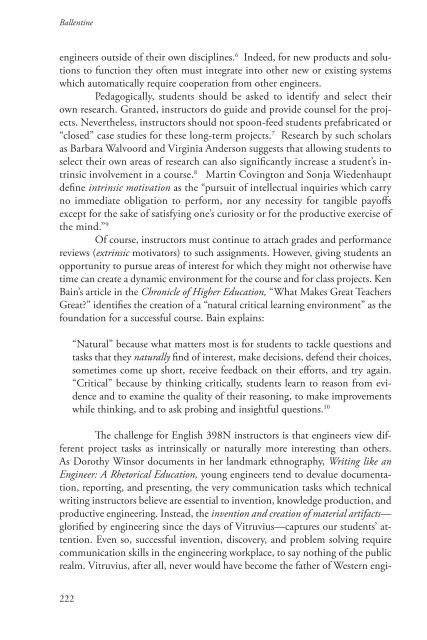Design Discourse- Composing and Revising Programs in Professional and Technical Writing, 2010a
Design Discourse- Composing and Revising Programs in Professional and Technical Writing, 2010a
Design Discourse- Composing and Revising Programs in Professional and Technical Writing, 2010a
You also want an ePaper? Increase the reach of your titles
YUMPU automatically turns print PDFs into web optimized ePapers that Google loves.
Ballent<strong>in</strong>e<br />
eng<strong>in</strong>eers outside of their own discipl<strong>in</strong>es. 6 Indeed, for new products <strong>and</strong> solutions<br />
to function they often must <strong>in</strong>tegrate <strong>in</strong>to other new or exist<strong>in</strong>g systems<br />
which automatically require cooperation from other eng<strong>in</strong>eers.<br />
Pedagogically, students should be asked to identify <strong>and</strong> select their<br />
own research. Granted, <strong>in</strong>structors do guide <strong>and</strong> provide counsel for the projects.<br />
Nevertheless, <strong>in</strong>structors should not spoon-feed students prefabricated or<br />
“closed” case studies for these long-term projects. 7 Research by such scholars<br />
as Barbara Walvoord <strong>and</strong> Virg<strong>in</strong>ia Anderson suggests that allow<strong>in</strong>g students to<br />
select their own areas of research can also significantly <strong>in</strong>crease a student’s <strong>in</strong>tr<strong>in</strong>sic<br />
<strong>in</strong>volvement <strong>in</strong> a course. 8 Mart<strong>in</strong> Cov<strong>in</strong>gton <strong>and</strong> Sonja Wiedenhaupt<br />
def<strong>in</strong>e <strong>in</strong>tr<strong>in</strong>sic motivation as the “pursuit of <strong>in</strong>tellectual <strong>in</strong>quiries which carry<br />
no immediate obligation to perform, nor any necessity for tangible payoffs<br />
except for the sake of satisfy<strong>in</strong>g one’s curiosity or for the productive exercise of<br />
the m<strong>in</strong>d.” 9<br />
Of course, <strong>in</strong>structors must cont<strong>in</strong>ue to attach grades <strong>and</strong> performance<br />
reviews (extr<strong>in</strong>sic motivators) to such assignments. However, giv<strong>in</strong>g students an<br />
opportunity to pursue areas of <strong>in</strong>terest for which they might not otherwise have<br />
time can create a dynamic environment for the course <strong>and</strong> for class projects. Ken<br />
Ba<strong>in</strong>’s article <strong>in</strong> the Chronicle of Higher Education, “What Makes Great Teachers<br />
Great?” identifies the creation of a “natural critical learn<strong>in</strong>g environment” as the<br />
foundation for a successful course. Ba<strong>in</strong> expla<strong>in</strong>s:<br />
“Natural” because what matters most is for students to tackle questions <strong>and</strong><br />
tasks that they naturally f<strong>in</strong>d of <strong>in</strong>terest, make decisions, defend their choices,<br />
sometimes come up short, receive feedback on their efforts, <strong>and</strong> try aga<strong>in</strong>.<br />
“Critical” because by th<strong>in</strong>k<strong>in</strong>g critically, students learn to reason from evidence<br />
<strong>and</strong> to exam<strong>in</strong>e the quality of their reason<strong>in</strong>g, to make improvements<br />
while th<strong>in</strong>k<strong>in</strong>g, <strong>and</strong> to ask prob<strong>in</strong>g <strong>and</strong> <strong>in</strong>sightful questions. 10<br />
The challenge for English 398N <strong>in</strong>structors is that eng<strong>in</strong>eers view different<br />
project tasks as <strong>in</strong>tr<strong>in</strong>sically or naturally more <strong>in</strong>terest<strong>in</strong>g than others.<br />
As Dorothy W<strong>in</strong>sor documents <strong>in</strong> her l<strong>and</strong>mark ethnography, Writ<strong>in</strong>g like an<br />
Eng<strong>in</strong>eer: A Rhetorical Education, young eng<strong>in</strong>eers tend to devalue documentation,<br />
report<strong>in</strong>g, <strong>and</strong> present<strong>in</strong>g, the very communication tasks which technical<br />
writ<strong>in</strong>g <strong>in</strong>structors believe are essential to <strong>in</strong>vention, knowledge production, <strong>and</strong><br />
productive eng<strong>in</strong>eer<strong>in</strong>g. Instead, the <strong>in</strong>vention <strong>and</strong> creation of material artifacts—<br />
glorified by eng<strong>in</strong>eer<strong>in</strong>g s<strong>in</strong>ce the days of Vitruvius—captures our students’ attention.<br />
Even so, successful <strong>in</strong>vention, discovery, <strong>and</strong> problem solv<strong>in</strong>g require<br />
communication skills <strong>in</strong> the eng<strong>in</strong>eer<strong>in</strong>g workplace, to say noth<strong>in</strong>g of the public<br />
realm. Vitruvius, after all, never would have become the father of Western engi-<br />
222


















